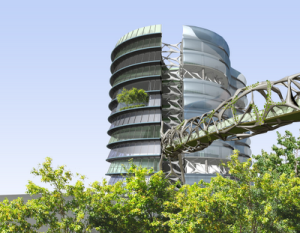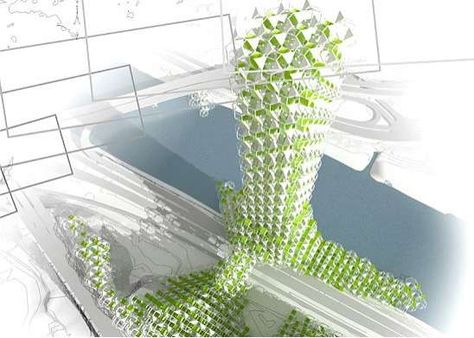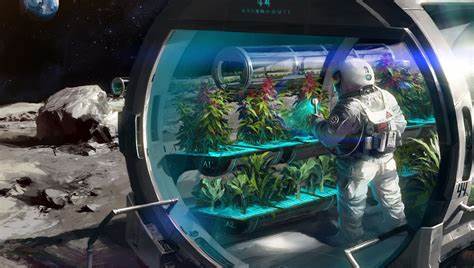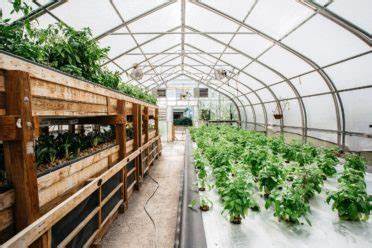
Vertical Farming: Bridging Science Fiction and Reality
Introduction
Vertical farming has emerged as an innovative solution to address the challenges of traditional agriculture by utilizing vertical space. This article explores the concept of vertical farming and its intersection with science fiction, delving into its historical background, key concepts, and the main discussion points surrounding this revolutionary approach to food production.
Historical Background
The origins of vertical farming can be traced back to the early 20th century, when visionary thinkers proposed the concept of multilevel agriculture. However, it wasn’t until the 1990s that the term “vertical farming” was introduced by a professor at Columbia University. Since then, the field has seen significant milestones, including the construction of the first commercial vertical farm in 2010 by AeroFarms.
Key Concepts and Definitions
Vertical farming is the practice of cultivating crops in vertically stacked layers, using methods like hydroponics, aeroponics, or aquaponics. It aims to optimize space utilization, reduce water usage, and minimize the environmental impact of traditional agriculture. This concept intersects with science fiction by pushing the boundaries of what was once considered impossible and bringing futuristic ideas into reality. It also involves key terms such as sustainable food production, urban agriculture, and controlled-environment agriculture.
Main Discussion Points
The influence of science fiction on the development of vertical farming
Science fiction literature and media have often portrayed vertical farming as a futuristic solution to feeding growing populations in limited spaces. These portrayals have sparked interest and inspired real-world developments in the field. Concepts like self-contained ecosystems and automated farming systems have been directly influenced by science fiction, driving innovation in vertical farming.
The impact of vertical farming on the realization of science fiction concepts
Vertical farming has successfully brought science fiction ideas, such as sustainable food production, into reality. By using advanced technologies and efficient resource management, vertical farms have overcome traditional farming limitations. This has not only led to increased crop yields in urban areas but has also addressed concerns regarding food security and environmental sustainability. However, challenges still exist, such as high energy consumption and initial setup costs.

The potential future applications and advancements of vertical farming
Looking forward, vertical farming holds immense potential for further integration with emerging technologies. The combination of vertical farming with artificial intelligence, robotics, and IoT can lead to unprecedented advancements in food production. Vertical farms could become hubs for research and development, experimenting with genetically modified crops and exploring new methods of sustainable agriculture. However, challenges, such as public acceptance and policy regulations, need to be addressed for widespread implementation.
Case Studies or Examples
Real-world examples of vertical farming projects exemplify the intersection between science fiction and reality. These initiatives showcase the successful integration of advanced technologies and sustainable farming practices. By utilizing vertical space and employing hydroponic systems, these projects demonstrate the feasibility of year-round, high-density crop cultivation in urban environments.
Current Trends or Developments
Recent trends in vertical farming include the application of machine learning algorithms for optimizing plant growth, the use of LED lighting to reduce energy costs, and the exploration of alternative crops, such as medicinal herbs. Advancements in vertical farming technology have resulted in increased efficiency, scalability, and cost-effectiveness. Researchers are also studying the potential of vertical farming for space exploration, envisioning self-sustaining food production systems for future missions.

Challenges or Controversies
Vertical farming faces challenges and controversies surrounding its economic viability and scalability. Critics argue that the high initial costs, energy consumption, and limited crop variety pose obstacles to wider adoption. Additionally, debates exist regarding the nutritional quality of crops grown in controlled environments compared to traditional farming methods. Differing viewpoints on the future of vertical farming highlight the need for further research, collaboration, and public awareness.
Future Outlook
The future of vertical farming holds immense promise. As the world grapples with the challenges of population growth, climate change, and food security, vertical farming offers a sustainable solution. Advancements in technology, coupled with ongoing research, can pave the way for increased food production, reduced environmental impact, and improved access to fresh produce. The integration of vertical farming with science fiction concepts could bring about transformative changes in agriculture, shaping the future of food production.

Conclusion
Vertical farming has revolutionized the way we approach food production, bridging the gap between science fiction and reality. By optimizing space and employing advanced technologies, vertical farms have made sustainable and efficient food production possible. As this field continues to evolve, collaborations between scientists, engineers, and visionaries will pave the way for a future where vertical farming plays a pivotal role in ensuring food security and environmental sustainability.
References
Despommier, D. (2010). The Vertical Farm: Feeding the World in the 21st Century. Macmillan.
Sanyé-Mengual, E. et al. (2015). Environmental analysis of the logistics of vertical farming systems. Journal of Cleaner Production, 107, 697-705.
Grewal, A. et al. (2019). Vertical Farming: Sustainable Way to Feed the Future. Sustainability, 11(22), 6172.
Schöttker, O. et al. (2021). Vertical Farming: The Future of Food Production? Trends in Biotechnology, 39(2), 141-144.
Rizzo, M. (2018). Vertical Farming: A Revolutionary Approach to Sustainable Urban Agriculture. Energy Procedia, 148, 305-312.




